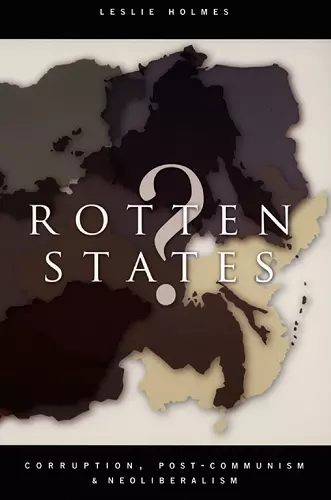Rotten States?
Corruption, Post-Communism, and Neoliberalism
Format:Hardback
Publisher:Duke University Press
Published:8th Jun '06
Currently unavailable, and unfortunately no date known when it will be back

An analysis of official corruption in post-communist countries, focused on Bulgaria, Hungary, Poland, Russia, and China
Analyzes corruption in post-communist countries, paying particular attention to Bulgaria, Hungary, Poland, Russia, and China. Drawing on data including surveys commissioned especially for this study, the author examines the causes and consequences of official corruption as well as ways of combating it.Official corruption has become increasingly prevalent around the world since the early 1990s. The situation appears to be particularly acute in the post-communist states. Corruption—be it real or perceived—is a major problem with concrete implications, including a lowered likelihood of foreign investment. In Rotten States? Leslie Holmes analyzes corruption in post-communist countries, paying particular attention to Bulgaria, Hungary, Poland, and Russia, as well as China, which Holmes argues has produced, through its recent economic liberalization, a system similar to post-communism. As he points out, these countries offer useful comparisons: they vary in terms of size, religious orientation, ethnic homogeneity, and their approaches to and economic success with the transition from communism.
Drawing on data including surveys commissioned especially for this study, Holmes examines the causes and consequences of official corruption as well as ways of combating it. He focuses particular attention on the timing of the recent increase in reports of corruption, the relationship between post-communism and corruption, and the interplay between corruption and the delegitimation and weakening of the state. Holmes argues that the global turn toward neoliberalism—with its focus on ends over means, flexibility, and a reduced role for the state—has generated much of the corruption in post-communist states. At the same time, he points out that neoliberalism is perhaps the single most powerful tool for overcoming the communist legacy, which is an even more significant cause of corruption. Among the conclusions that Holmes draws is that a strong democratic state is needed in the early stages of the transition from communism in order to prevent corruption from taking hold.
“Leslie Holmes’s book charts the shady terrain of post-communist corruption with rigor and elegance. Among his accomplishments are a fine-grained conceptual analysis, the compilation of a uniquely rich body of data on five countries, and a thorough and imaginative discussion of the causes, consequences, and potential cures of corruption in societies facing transitions to neoliberalism.”—Claus Offe, author of Varieties of Transition: The East European and East German Experience
“This is a well-documented book based on keen comparisons of the corruption that permeates several Central and Eastern European countries, their institutions, their organizations, and their cadres. Combining these elements, Leslie Holmes offers stimulating insights that move us closer to a theory of corruption.”—Harry Makler, Professor Emeritus, University of Toronto, and Visiting Scholar, Stanford University
ISBN: 9780822337799
Dimensions: unknown
Weight: 767g
440 pages